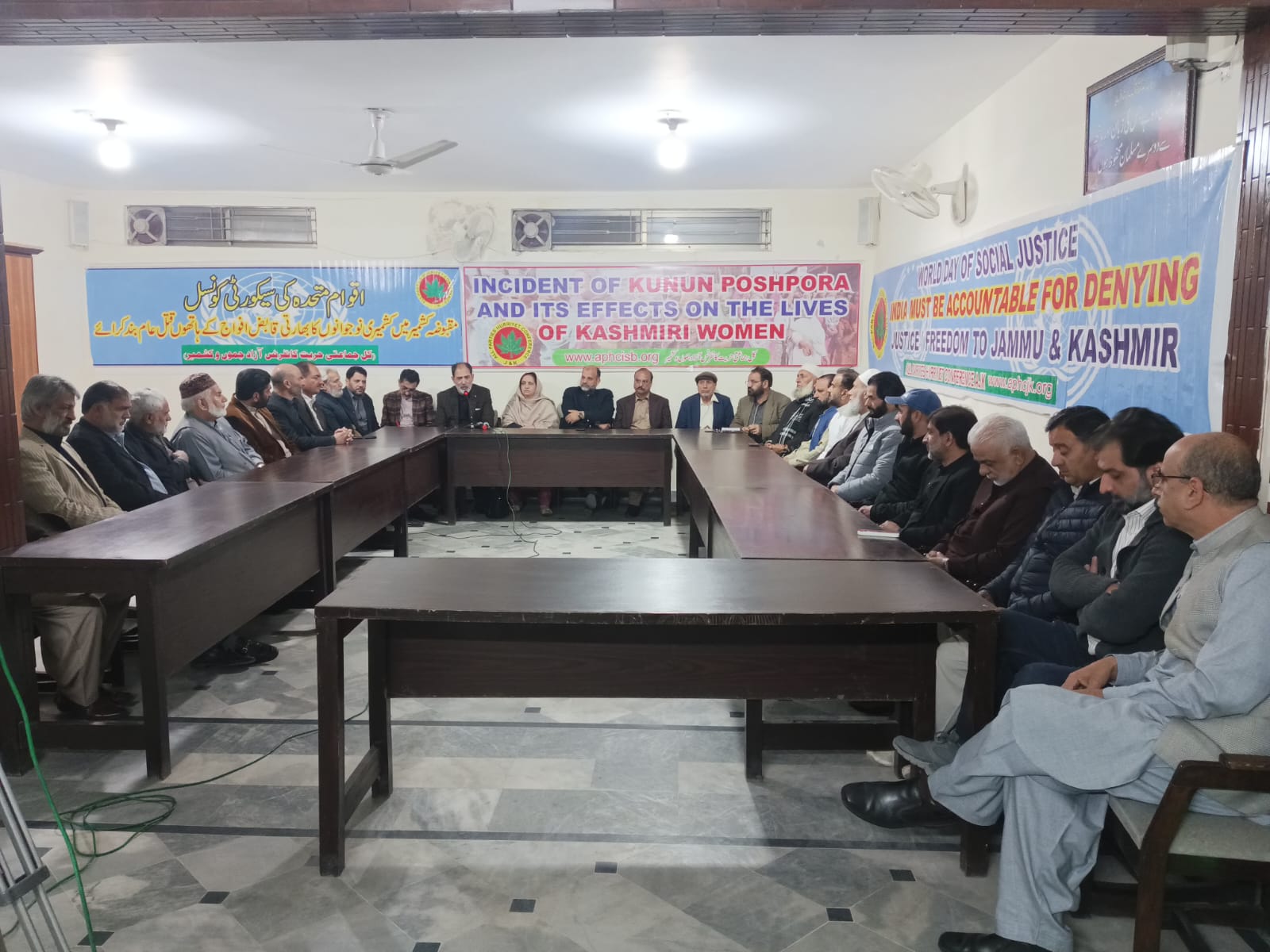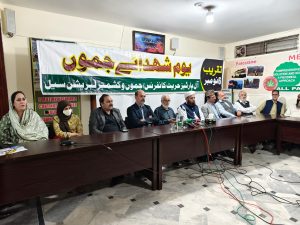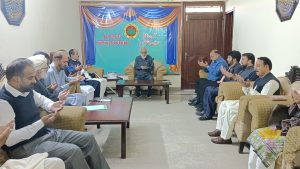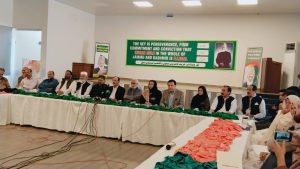APHC-AJK expresses solidarity with victims of Kunan-Poshpora tragedy
Islamabad: The All Parties Hurriyat Conference Azad Jammu and Kashmir (APHC-AJK) chapter has expressed solidarity with the victims of Kunan-Poshpora tragedy and urged United Nations to take notice of the worst human rights violations by Indian troops in occupied Jammu and Kashmir.
According to Kashmir Media Service, speakers in a seminar organized by the APHC-AJK at its office in Islamabad and presided over by Convener Mehmood Ahmed Saghar strongly condemned the role of Indian government and judiciary in protecting the troops involved in the tragic incident of Kunan-Poshpora mass rape.
APHC-AJK Convener Mahmood Ahmed Saghar and other speakers addressing the seminar said February 23, 1991 will always be remembered as a dark day and deplored that the victims of Kunan-Poshpora incident were still waiting for justice despite the passage of 33 years.
They said that the Indian men in uniform were found guilty in the impartial investigation of this tragedy, but later the Indian government covered up the incident with false pretenses and the perpetrators were given a clean chit. They said the Kashmiri women are actively involved with the freedom movement.
The speakers said the Indian troops are using rape as a weapon of war to crush the freedom spirit of the Kashmiri people, but despite that, the morale of the Kashmiri people, including woman, is high and they will continue the freedom movement till it reached its logical end.
Paying homage to the martyrs of Kashmir, the speakers said the great sacrifices of the martyrs would bring positive results soon, adding the international community should take cognizance of the Indian state terrorism and play role in resolving the Kashmir dispute in accordance with the Kashmiris’ aspirations.
The speakers included Muhammad Farooq Rahmani, Syed Faiz Naqshbandi, Mir Tahir Masood, Sheikh Abdul Mateen, Imtiaz Wani, Altaf Hussain Wani, Nisar Mirza, Dawood Yousafzai, Sheikh Muhammad Yaqoob, Sanaulla Dar, Haji Sultan Butt, Advocate Pervaiz Ahmed, Sheikh Abdul Majid, Gulshan Ahmed, Manzoor Ahmed Dar, Zahid Safi, Adeel Mushtaq Wani, Abdul Majeed Lone, Zahid Ashraf, Syed. Mushtaq, Muhammad Shafi Dar, Khurshid Ahmed Mir. Mian Muzaffar, Mushtaq Ahmed Butt, Muhammad Ashraf Dar, Nazir Ahmed Karnai, Dr Asfa, Qazi Imran, Imtiaz Butt, Ghulam Nabi Butt, Muhammad Zareen Abbasi, Raja Bashir Usmani, Shaukat Ali Khan and others.
Meanwhile, APHC-AJK chapter senior leader Muhammad Farooq Rehmani in a statement in Islamabad said Kunan-Poshpora mass rape tragedy of Kashmiri women and girls in the night of 23rd February, 1991, is a heinous crime of incomparable magnitude that cannot be weighed in words by tongue or by pen, and the perpetrators can never be absolved without an impartial judicial investigation and court trial.
He said no generation of the Kashmiris would ever forget the tragic incident of 1991 Kupwara Kunan-Poshpora. He stated that Indian army used rape as a weapon to silence the voice of freedom and humiliate the people of Kashmir during 1990s, but failed to win over the hearts of the people.
He firmly stated that no Kashmiri would ever withdraw their demand of court trial and exemplary punishment to the perpetrators of the rape and murder crimes in Jammu and Kashmir during the last 30 years, including justice for the victims of the Kunan-Poshpora tragedy.
Head of women wing of Pasban-e-Hurriyat Mehnaz Quraishi in a statement in Muzaffarabad said that India forces always used sexual assault and violence against Kashmir as weapon. She said that sexual assaults on Kashmiri women on February 23, 1991 in Kunnan Poshpora were a slap on the face of India’s so-called democracy and secularism.
“Indian soldiers besieged the two villages of Kunnan and Poshpora in Kupwara district late at night, the men were taken out of their homes and held hostage at gunpoint, soldiers entered the homes of civilians where Kashmiri women were sexually assaulted” she lamented.
She said that despite hearing condemnation from the whole world on this horrible incident, Indian rulers and biased judiciary did not take any action against those guilty soldiers.




